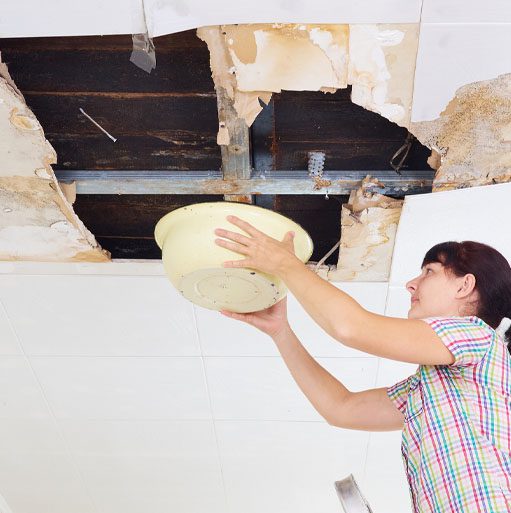Your brand-new roof has a leak. What should you do if your latest investment doesn’t keep the elements out? Take a look at the steps you can take if your new roof doesn’t work as it should.
Don’t DIY
Are you tempted to investigate the new roof’s issue and try your own do-it-yourself repair? Aside from putting yourself in physical risk (if you slide or fall off the roof), you may invalidate an existing warranty or cause more damage.
A new roof shouldn’t leak. If yours lets the rain, snow, or anything else in, you need to call a professional. Start with the contractor who installed the roof. If you don’t trust this person or company, they won’t return your calls, or you don’t feel that they can adequately remedy the problem, you may need to contact another professional.
Gather Information
When did the leak start? Where do you see water? Is this a new problem or an existing one that the new rood didn’t stop? Gather as much information about the issue as you can. While you don’t have to (and shouldn’t) walk onto the roof to inspect the problem, the more you can tell the roofer about the leak, the easier it is for them to evaluate it and diagnose the source.
Explore the Options
Do you assume the new roof’s issues stem from subpar installation or materials? While workmanship and material choice can impact the ability to keep the weather out, these aren’t the only potential culprits. The installation and roof itself may be high-quality — even with a leak.
Roof leaks are complicated and come from many different sources. Along with the shingles, metal, tiles, or other primary roofing material, leaks can result from damaged or low-quality flashing (the metal pieces that cover seams or joints), chimneys, vents, or gutters.
Before you point fingers at a roofer, explore the possible causes. If the installation contractor suggested the addition of flashing, new masonry, new gutters, or another repair and you declined, the issue may predate the new roof.
Find the Right Professional
If you can’t use the contractor who installed the new roof to fix it, you need to find the right professional to evaluate and repair the issue. Where should you start? Chances are you explored other roofer options when you made the initial choice. Go back to your list and revisit the idea of one of these other professionals. If that idea doesn’t appeal to you, move on to someone new.
Look for a contractor who is:
- Established. The contractor should have a history of working in the roofing industry for several years. An established roofer has the expertise and experience to do the job right the first time.
- Local. The contractor should know the local area’s rules when it comes to building permits and other related regulations.
- Recommended. Ask for recommendations or ask people who you know in real life which roofing company they chose. Don’t assume online recommendations from anonymous sources are real or reliable.
- Experienced. The contractor should have the experience necessary to diagnose the leak and repair your roof. If your roof is made from a specialty material or has another issue, ask the contractor if they regularly handle this type of job.
If you do choose a second contractor for the repairs, your warranty won’t necessarily cover the costs. Even though you may need to pay additional out-of-pocket expenses yourself, failure to repair the new roof could result in even more costly damage to your home.
Do you need a roof repair? Contact Seagate Roofing and Foundation Services for expert repairs you can trust.

